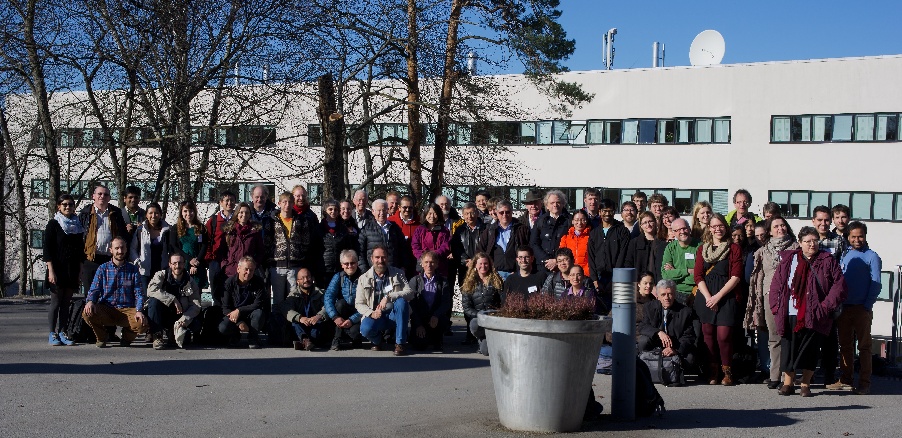Video recordings
Please let us know if any of the recordings should not be made public.Abstracts

Venue
Oskar Klein Auditorium, Roslagstullsbacken 21, level 4.
Nordita, Stockholm, Sweden
Background
Scientific recording of sunspots started with Galileo in 1609. Since Hale (1908) we know that sunspots are strong concentrations of magnetic field of up to 4000 gauss. They could be formed by subsurface magnetic flux tubes piercing the surface. Meanwhile, numerical simulations by many different groups suggest that strong magnetic fields could be generated in the bulk of the convection zone. This would mean that sufficiently strong magnetic fields may be generated not far from the surface. However, at the surface the magnetic field appears to be strongly concentrated into only a few isolated spots - in stark contrast to the more diffuse magnetic field beneath the surface. This is still a mystery.Scientific Organizing Committee
The detailed plan of the meeting has been established by the Scientific Organizing Committee including Axel Brandenburg (PI, Nordita), Mark Cheung (Lockheed, Palo Alto), Laurent Gizon (MPS, Göttingen), Petri Käpylä (Helsinki University), Alexander Kosovichev (Big Bear), Åke Nordlund (NBI), Matthias Rempel (HAO/NCAR), Göran Scharmer (Co-PI, Stockholm University), Alexandra Tritschler (NSO, New Mexico), and Jörn Warnecke (MPS, Göttingen).Local Organizing Committee
Illa R. Losada (Chair, Nordita and Stockholm University), Sarah Jabbari (Nordita and Stockholm University), Bidya Binay Karak (Nordita), Hiva Pazira (Stockholm University), Nishant Singh (Nordita), Tine Libbrecht (Stockholm University), Carolina Robustini (Stockholm University), Anne Jifält (Nordita, conference secretary), and also Elizabeth Yang (Nordita, conference secretary).Scope of the meeting
To set the scene, the meeting will start with a session on global properties of the Sun's magnetic field. Next, we need to discuss observational constraints and results from global helioseismology. This will lead to the consideration of what causes flux emergence from an observational and theoretical point of view. There are conflicting ideas about deep seated versus distributed magnetic field generation in the Sun that need to be highlighted. Next, we focus on local magnetic flux concentrations. There are new theoretical results that can potentially be checked using local helioseismology. One of the particular characteristics of sunspots are surface effects relevant to spot formation. There are new ideas about enhanced cooling mechanisms relevant to spot formation. The region around sunspots, i.e., the so-called penumbra, is another important example that demonstrates the interaction of magnetic fields with convection. The importance of magnetic effects is also evidenced by the occurrence of umbral dots and light bridges. Finally, we open the forum to discuss opposing views on sunspot formation and try a reach a coherent picture of solar activity.Invited speakers (confirmed)
Karel Schrijver, Lockheed, Palo Alto (session 1)Tom Duvall, Goddard & Göttingen (session 2)
Bob Stein, Michigan State Univ. (session 3)
Irina Kitiashvili, CTR, Stanford (session 3)
Aaron Birch, MPS, Göttingen (session 5)
Yuhong Fan, HAO, Boulder (session 4)
Hotta Hideyuki, HAO, Boulder (session 4)
Junwei Zhao, Stanford (session 5)
Hannah Schunker, MPS, Göttingen (session 5)
Robert Cameron, MPS, Göttingen (session 6)
Rolf Schlichenmaier, KIS, Freiburg (session 7)
Matthias Rempel, HAO, Boulder (session 7)
Mark Cheung, Lockheed, Palo Alto (session 9)
+ others (to be confirmed)
Preliminary program
We plan to organize 8 sessions with talks and discussions and one last summarizing session. In each of the session we will try to have observational, theoretical and simulation points of view. Most of the talks will be 30 minutes long. Additional contributions will be accommodated as shorter talks or posters. There will be a discussion session at the end of each day. The topics for each day include:Monday am: Session 1. Global properties of the Sun's magnetic field
Monday pm: Session 2. Observational constraints and results from global helioseismology
Tuesday am: Session 3. Flux emergence: observational and theoretical results
Tuesday pm: Session 4. Deep seated vs. distributed magnetic field generation in the Sun
Wednesday am: Session 5. Local flux concentration: theoretical results and local helioseismology
Wednesday pm: Session 6. Surface effects relevant to spot formation. Cooling mechanisms
Thursday am: Session 7. Penumbra formation. Magnetic effects, umbral dots, light bridges, etc.
Thursday pm: Session 8. Opposing views on sunspot formation.
Friday: Session 9. Coherent picture of solar activity.
Registration
Registration deadline (extended): 23 January 2015
Registration fee: 2000 SEK/214.4 EUR/240.42 US Dollar
The registration fee includes lunches, conference dinner and excursion.
Payment method : bank tranfer.
Please, it is very important to write the reference number, your name (or surname) and the code of the conference "SUNSPOT2015”. E.g.:Ref: “4940165 Foo Bar SUNSPOT2015”
Swedish participants:
Plusgiro 15657-0
Bankgiro 5050-0206 (Danske bank)
Non-Swedish/Overseas participants:
Bank: Swedbank, 10534 Stockholm
Bankkonto: 890119243778462 Iban: SE7480000890119243778462 Swift/bic: SWEDSESSTravel stipends
PhD students and young Postdoc fellows are eligible for travel grants to participate in the program. If you are interested in such a grant, please mark the corresponding field in the application form, briefly summarize your interest in the program in the comments field, and indicate an estimation of your expected travel expenses. Since only a limited number of grants is available, decision concerning the grants will be made on a case-by-case basis and you will be notified shortly after the application deadline.
Accommodation
Reduced rates are available at Arcadia Hotel and BizApartments If you need help, please contact the conference secretary Anne Jifält (alternatively Elizabeth Yang).

